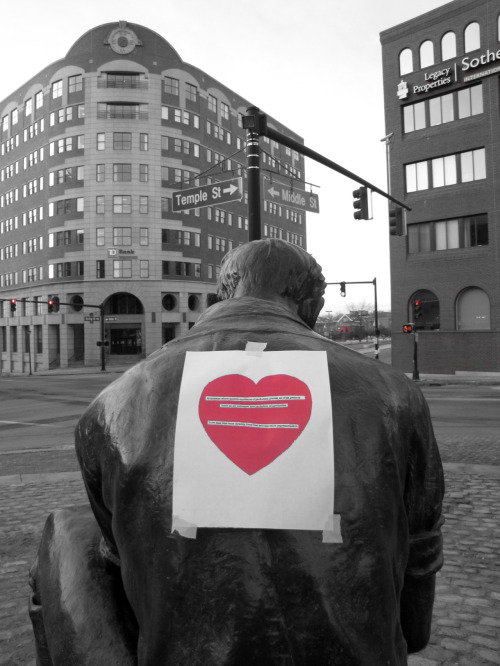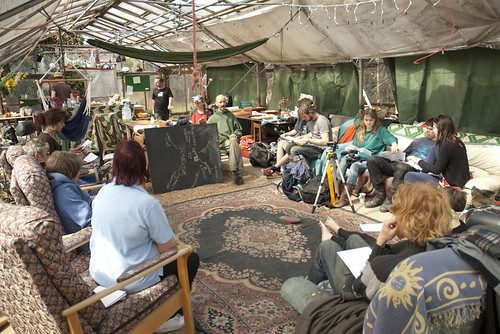A Very Situationist Valentine's Day
The Occupy camps have been dismantled — and yet, none of the motives behind the movement have disappeared. Maybe that's why I've noticed a revival of Situationist thought on city streets in my hometown and elsewhere around the globe.
Yesterday, for Valentine's Day, a Good Samaritan posted these flyers around Portland, Maine:
 (photo by shannont, via Unseen Portland)
(photo by shannont, via Unseen Portland)
It reads: “In societies where modern conditions of production prevail, all of life presents itself as an immense accumulation of spectacles. Love that was once directly lived has become mere representation.” From Guy Debord's Society of the Spectacle.
Another flyer reads "Young people everywhere have been allowed to choose between love and a garbage disposal unit. Everywhere they have chosen the garbage disposal unit" (another quote from Debord).
And in London, artist Robert Montgomery has appropriated billboards to post his Situationist poetry. This one is probably my favorite (via The Morning News, which has more samples of his work):

Valentine's Day might be the perfect Situationist holiday, especially now, when its hyper-commodified version of love is drawing so much cynicism towards itself in our bailout economy.
And yet, for anyone lucky enough to enjoy real love — not the spectacle, but the genuine article, without the chintzy chocolates or greeting cards or mall-bought lingerie — real love is an act of revolution: a reminder that we can be rich without the fake wealth of the global economy.
Thanks to Jess, I count myself in that number. All the hedge fund managers can go fuck their garbage disposal units (and I'd love to see them try).
Yesterday, for Valentine's Day, a Good Samaritan posted these flyers around Portland, Maine:
 (photo by shannont, via Unseen Portland)
(photo by shannont, via Unseen Portland) It reads: “In societies where modern conditions of production prevail, all of life presents itself as an immense accumulation of spectacles. Love that was once directly lived has become mere representation.” From Guy Debord's Society of the Spectacle.
Another flyer reads "Young people everywhere have been allowed to choose between love and a garbage disposal unit. Everywhere they have chosen the garbage disposal unit" (another quote from Debord).
And in London, artist Robert Montgomery has appropriated billboards to post his Situationist poetry. This one is probably my favorite (via The Morning News, which has more samples of his work):

Valentine's Day might be the perfect Situationist holiday, especially now, when its hyper-commodified version of love is drawing so much cynicism towards itself in our bailout economy.
And yet, for anyone lucky enough to enjoy real love — not the spectacle, but the genuine article, without the chintzy chocolates or greeting cards or mall-bought lingerie — real love is an act of revolution: a reminder that we can be rich without the fake wealth of the global economy.
Thanks to Jess, I count myself in that number. All the hedge fund managers can go fuck their garbage disposal units (and I'd love to see them try).








